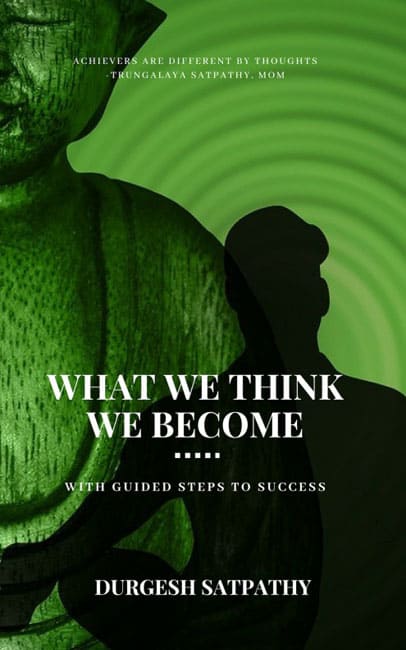SUBJECT: 4/5
WRITING STYLE: 3/5
RELEVANCE: 4/5
OVERALL: 3/5
“We can complain because rose bushes have thorns, or rejoice because thorn bushes have roses.”
~ Abraham Lincoln
My Musings
Everyone once in a while I come across a book that pushes me to hustle harder, inspires me to perform better, encourages me to live happier, and persuades me to become a better version of myself.
Some of these books are tediously lengthy reads that require days of reading and learning, while others are much simpler and straight forward in their concepts and values.
I recently had a chance to read Durgesh Satpathy’s What We Think We Become, a short and simple read that is perfect for a beginner level reader who is looking for a self-help read.
Read on to know more about my thoughts on the book.
What to expect?
What We Think We Become is a book that is written in a simple and easy to understand language and which can be read in a matter of just a few hours.
The book isn’t your exhaustive self-development guide but it does provide a basic framework for those just beginning to turn to the self-help genre.
Keeping the above in mind, expect a book that is best suited for beginners as a light self-help read.
The relevance in today’s world
In today’s world when the digital, as well as the physical space, is full of loads and tons of contradictory content, it becomes all the more difficult to pursue a single line of thought and apply it in one’s life.
To break through this unnecessary clutter, it is best to stick to a single author or book and practice what it preaches.
Humans are a complicated species who can be best described as slaves of the mind. It is therefore of utmost importance to control, govern and manage our minds in order to best suit our needs (read goals).
This book is a welcome step which aims at pushing us in the right direction to success and happiness.
How good is the writing style?
The author’s writing is succinct and crisp. He doesn’t believe in beating around the bush and is mostly to the point.
The fact that he supports the concepts with the help of a number of examples and even anecdotes from his own life is an added bonus. What strikes you the most is how brief the chapters are and yet how meaningful each of them is.
The author has mastered the art of “less is more” quite well.
What I liked?
I like how Durgesh has summarized each chapter at multiple points – at the beginning of the book in the contents section and at the end of each chapter.
I also liked how he has made use of a number of illustrations and tables to help in better understanding of the concepts explained.
What I did not like?
The biggest fallback of the book is its editing. Unfortunately, the editing is completely off the mark and this is a major drawback for the book.
There are powerful messages and concepts whose true impact is lost in those poorly edited paragraphs.
Since editing is a major parameter which influences my ratings for a book, it will be safe to assume that it is the editing that drags my rating down for What We Think We Become.
The final verdict
In the end, the book has lessons for anyone who wants to take a step forward in the direction of happiness and success.
It doesn’t come without issues (poor editing) but if someone can manage to somehow overlook them, the book manages to inspire the reader with just a little bit of effort and time.
Pick it up
- If you are a beginner level reader.
- If you are looking for a self-help book that is easy and quick to read.
Skip it
- If you have read similar books before.
- If you cannot stand poor editing.
Can’t wait to read it? Buy your copy of What We Think We Become using the link below.
